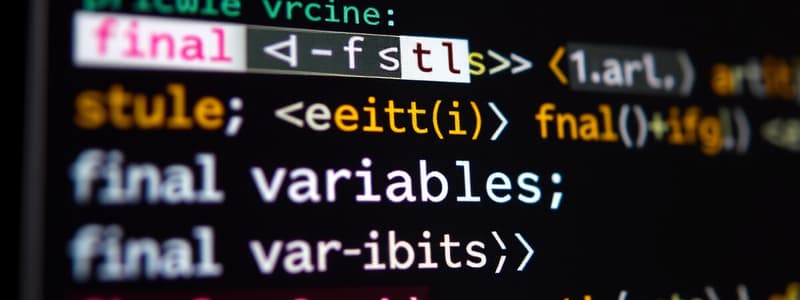Podcast
Questions and Answers
What is a Final variable?
What is a Final variable?
- Declaring a variable final fixes the variable's value. (correct)
- Declaring a variable final allows its value to change.
- Final variables do not exist in Java.
- Final variables are always mutable.
Is the String class mutable?
Is the String class mutable?
False (B)
What happens if you declare a String as Final in the variable declaration?
What happens if you declare a String as Final in the variable declaration?
Java will not allow re-assignment of this variable.
In Java, which types of things are immutable? (Select all that apply)
In Java, which types of things are immutable? (Select all that apply)
In Java, which types of things are mutable? (Select all that apply)
In Java, which types of things are mutable? (Select all that apply)
What are the two types of final variables?
What are the two types of final variables?
What are instance variables?
What are instance variables?
What happens if you declare a mutable instance variable as final but do not initialize it?
What happens if you declare a mutable instance variable as final but do not initialize it?
What happens if you try to update a primitive instance variable that's been declared final?
What happens if you try to update a primitive instance variable that's been declared final?
What happens if you try to update an object instance variable that's been declared final?
What happens if you try to update an object instance variable that's been declared final?
What is something similar to declaring an instance variable final but is different?
What is something similar to declaring an instance variable final but is different?
What is a recommended practice for instance variables?
What is a recommended practice for instance variables?
What is a generally bad coding practice with method parameters?
What is a generally bad coding practice with method parameters?
What will be the impact of declaring method parameters as final?
What will be the impact of declaring method parameters as final?
What is the impact of declaring a class as final?
What is the impact of declaring a class as final?
Flashcards are hidden until you start studying
Study Notes
Final Variables in Java
- Declaring a variable as final in Java fixes its value, preventing reassignment even if the referenced object is mutable.
- A final String variable cannot be re-assigned, leading to compilation errors if attempted.
String Class
- The String class is immutable; assigning a new value to a String variable creates a new character array on the heap.
- Final String variables cannot be re-assigned, reinforcing the immutability characteristic of Strings.
Immutable and Mutable Types
- Immutable types in Java include all primitives, wrapper classes (e.g., Integer, Long), and some objects like String.
- Mutable types include collections (like ArrayLists), StringBuilder, and custom classes with mutable fields.
Making Custom Objects Immutable
- To make a custom object immutable, additional steps must be considered, typically not covered in basic readings.
Types of Final Variables
- There are two types of final variables: instance variables and method parameters.
Instance Variables
- Instance variables are specific to objects, holding data unique to each instance.
Compilation Behavior of Final Variables
- Declaring a mutable instance variable as final without initialization leads to a compilation error.
- Updating a final primitive or object instance variable results in compilation errors.
Constants vs. Final Variables
- Constants are similar to final variables but require the static keyword, limiting their occurrence to one per class.
Best Practices for Instance Variables
- Use setters for instance variables to allow future development flexibility.
- Mark instance variables as final to indicate they shouldn't change.
Method Parameters and Best Practices
- Reassigning method parameters is considered poor practice; modifying them may be acceptable, but can lead to confusion.
- Declaring method parameters as final prevents updates and enforces best practices during compilation.
Effect of Final on Classes
- Declaring a class as final prevents other classes from extending it, disallowing subclasses.
- It also restricts method overriding, maintaining the integrity of the class's methods.
Studying That Suits You
Use AI to generate personalized quizzes and flashcards to suit your learning preferences.




